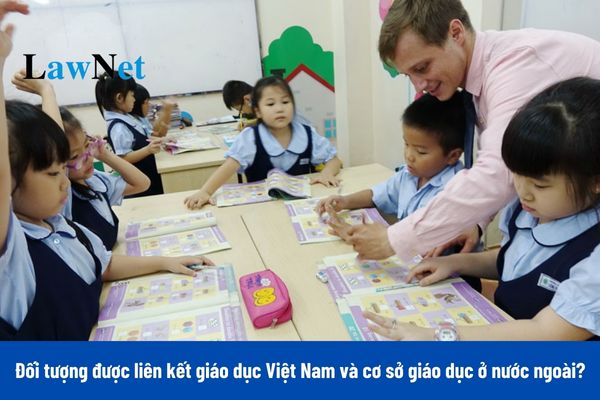Which entities are involved in Vietnam's educational collaboration with overseas educational institutions?
Which entities are involved in Vietnam's educational collaboration with overseas educational institutions?
Based on Article 6 of Decree 86/2018/ND-CP (amended by Clause 4, Article 1 of Decree 124/2024/ND-CP), the subjects eligible for educational collaboration are regulated as follows:
- Vietnamese Party: Private preschool and private general education institutions invested by domestic investors, ensuring operational conditions, established, and operating in Vietnam.
- Foreign Party:
+ Educational institutions established and operating legally abroad, with at least 5 years of operation abroad up to the date of application submission, not violating the laws of the host country during the operation, conducting direct teaching, possessing a valid educational quality accreditation certificate, or recognized by an authorized foreign education institution or organization regarding educational quality;
+ Organizations providing educational programs established and operating legally abroad, with at least 5 years of experience in delivering preschool or general educational programs up to the date of application for educational collaboration.

Which entities are involved in Vietnam's educational collaboration with overseas educational institutions? (Image from the Internet)
What are the regulations for the dossier of application for educational collaboration in Vietnam?
Based on Clause 1, Article 9 of Decree 86/2018/ND-CP, the dossier for approval of educational collaboration includes:
- Application for approval of educational collaboration with a foreign partner signed by the collaborating parties according to Form 01 in the Appendix issued with this Decree;
- Agreement or cooperation contract between the collaborating parties, including detailed information about the parties involved, responsibilities of each party regarding specific commitments on the program, study and teaching materials, teachers, facilities, assessments, evaluations, diplomas, financial information, and other contents;
- Documents proving the legal status of the collaborating parties: Certified copy or a copy presented with the original for comparison of the decision to establish or permit the establishment of the educational institution or other equivalent documents;
- Foreign educational program content and subjects integrated into the proposed integrated educational program;
- Documents, explanatory materials on the integration of the educational program;
- Educational quality accreditation certificate of the foreign educational program or approval documents of the foreign educational program issued by a competent body or organization (certified copy or a copy presented with the original for comparison);
- Scheme for implementing educational collaboration with a foreign partner developed by the collaborating parties according to Form 02 in the Appendix issued with this Decree, including the main contents: Necessity; introduction of collaborating parties; content of collaboration;
- Facilities, equipment; list of proposed teachers with professional backgrounds; subjects, criteria, and scale of enrollment; diplomas, certificates to be issued, foreign diploma or certificate equivalence to Vietnam's national education system diplomas and certificates (if any);
- Measures to ensure the rights of learners and workers; division responsible for the collaboration, personal background of representatives from the Vietnamese educational institution and the foreign educational institution involved in program management; tuition fees; financial support from Vietnamese and foreign individuals and organizations (if any), budget estimates, financial management mechanism; responsibilities and powers of collaborating parties; responsibilities and powers of teachers and students.
What are the authority and procedures for approving educational collaboration in Vietnam?
Based on Clause 1, Article 10 of Decree 86/2018/ND-CP (supplemented by Point a, Clause 1, Article 2 of Decree 124/2024/ND-CP), the authority and procedures for approving educational collaboration are regulated as follows:
Step 1: The Director of the Department of Education and Training approves educational collaboration with a foreign partner;
Step 2: The collaborating parties submit one dossier directly, via postal service, or through the online public service portal to the Department of Education and Training;
Step 3: Within 10 working days from the date of receiving the complete dossier as prescribed in Clause 1, Article 9 of this Decree, the dossier-receiving agency is responsible for appraising the dossier and submitting it to the Minister of Education and Training for approval of the integrated educational program as stipulated in Point c, Clause 1, Article 7 of Decree 86/2018/ND-CP;
In cases where the dossier is incomplete, within 5 working days from the date of receiving the dossier, the Department of Education and Training will notify in writing, directly or via postal service or email, to the collaborating parties;
Step 4: Within 5 working days from receiving the integrated program appraisal results from the Ministry of Education and Training, the Department of Education and Training makes an approval decision on educational collaboration according to Form 03 in the Appendix issued with Decree 86/2018/ND-CP. In cases where educational collaboration is not approved, the Department of Education and Training issues a response document stating the reasons.

